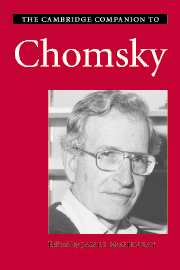Book contents
10 - Meaning and creativity
from Part II - Chomsky on the human mind
Published online by Cambridge University Press: 28 May 2007
Summary
Introduction
Often, philosophers, linguists, and cognitive scientists aiming to construct a theory of meaning for languages focus on how words are used by people to deal with the world. They might assume there is a regular way in which the word dolphin is used - that people regularly use dolphin to refer to or denote a class of aquatic beasts. And they might assume that there is a central, core use of words - using She has a pet dolphin to correctly describe some state of affairs, perhaps. If these assumptions were correct, dolphin might then be defined in terms of some regular function(s) it serves in a community of individuals who “speak the same language,” understood as “use words in the same way” (cp. Davidson 1967, Sellars 1974; contrast Chomsky 1996a, b, 2000a, Fodor 1998). These assumptions are built into technical terms: “truth (or correctness) conditions,” “functional (or conceptual) role,” etc. Because these attempts focus on communities, circumstances, things, and so on, I call them “externalist” approaches.
Externalist assumptions are wrong. Chomsky (1959, 1966, 1975, 1980, 1981a, 1986, 1995b, 1996a,b, 2000a), recalling observations that go back to Descartes (see below), repeatedly points this out. Words do sometimes get used by people in similar ways; and they do sometimes come to be related to the world. But they do neither by themselves. Similar uses and relations to the world are products of human actions, of words' free and typically creative use by humans. Because people use words for all sorts of purposes, because the use of language is a form of free action, and because there is little reason to think that there can be a science of free action, there is little reason to think that there can be a naturalistic externalist theory of meaning.
- Type
- Chapter
- Information
- The Cambridge Companion to Chomsky , pp. 204 - 222Publisher: Cambridge University PressPrint publication year: 2005
- 4
- Cited by



